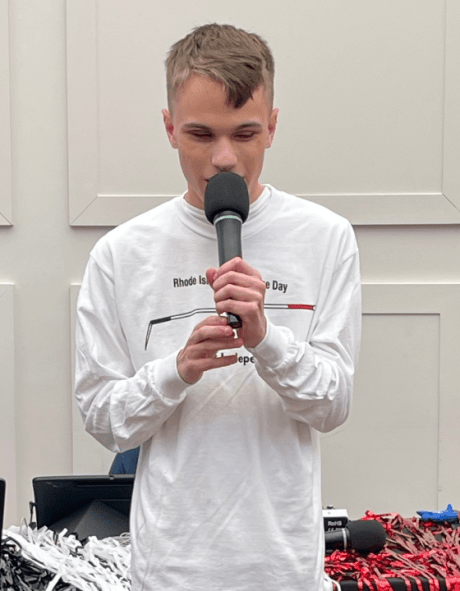
The Rhode Island Vision Education and Services Program at the Sherlock Center empowers students to build independence, gain confidence and connect with supportive communities – skills that help them succeed in education, leadership and life.
Ryan Lukowicz is in his sophomore year studying political science and legal studies at Roger Williams University this fall. A graduate of North Kingstown High School, he received services from the Rhode Island Vision Education and Services Program, or RIVESP, through the Sherlock Center starting when he was 3. He joined the Sherlock Sentinels consumer advisory committee in June 2023.
In what ways has the Sherlock Center made a difference in your life?
Learning skills like how to use technology, navigate an environment and complete different areas in the Expanded Core Curriculum in independent living. Most importantly, I made a lifelong human connection with one of my providers who was able to balance being kind and supportive while holding high expectations. This has contributed to my success in college to achieve a 3.9 GPA my first semester along with becoming a student senator and vice president of the College Democrats.
What support, training or resources have you received through the Sherlock Center?
In addition to everything above, I still maintain a community and communicate with others who have disabilities because I am a member of the [Sherlock Sentinels] consumer advisory committee. I also met lots of students at external camps and events through other service providers who worked for the [Sherlock Center]. This makes me feel that I am not alone and that I have role models who have shown me that a disability is not the characteristic that defines you.
How has the Sherlock Center helped you access better education, employment or community opportunities?
One story that stands out is when my two providers teamed up my freshman year to do a full-day field trip to Newport. Having a hybrid learning model during COVID allowed us to do more community-based work and that was one of the few positives about the pandemic. First, I used RIPTA and Uber to get around the city, which was a first. I worked on talking to the drivers, using the transit apps and navigating in and out of different kinds of vehicles. We attended a tour of the mansions and went out to lunch. I used my phone to take pictures of the sights and menu to have an app describe what it saw for me. I also had never used my cane in such historical and beautiful spaces before. Soft skills like critical thinking and time management had to be blended in as well. We all had a great time and I learned while having fun in an interactive way.
How has the Sherlock Center helped you feel more included or supported in your community?
RIVESP providers exposed me to different community settings and we went on a range of field trips to explore street crossings and troubleshoot how I would ask for help if I had never been somewhere before. I became a better advocate in community settings as a result.
What do you wish more people knew about the Sherlock Center?
I wish more people know the range and extent to which their services helped various people at their own ages and stages in their journeys. Despite specializing in developmental disabilities, they also have programs for those with visual and hearing impairments. I did not understand their value until becoming a Sherlock Sentinel my junior year of high school.
If you could describe the Sherlock Center in three words, what would they be and why?
Empowering, educational and supportive. Every staff member at the Sherlock Center wants the best for their consumers they work with. Education is done in whatever setting is best – individually or in a group. You will feel empowered after you learn something from their staff that can be beneficial to you personally.
